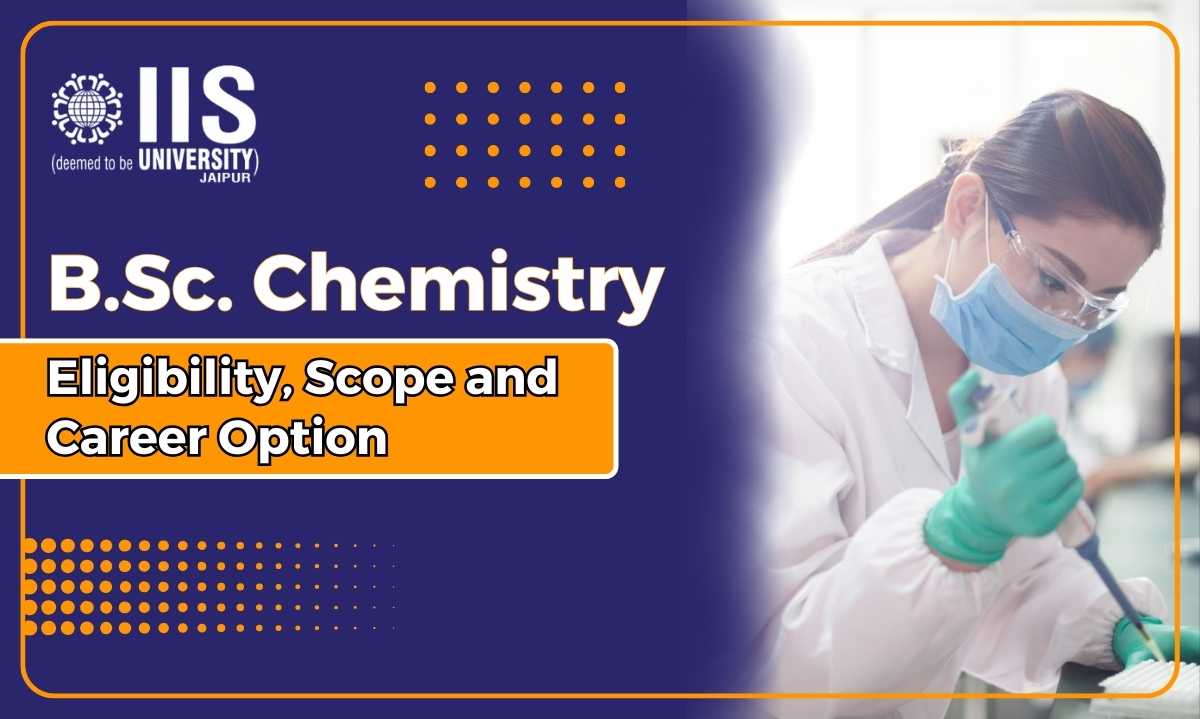Table of Contents
ToggleDo you find the secrets of the molecular world, chemistry, and reactions fascinating?
Are you the kind of person who is always curious about new medications and how they work together? If so, getting a BSc in chemistry might be one feasible career path for you.
Let’s examine the prerequisites, the BSc Chemistry scope, and the possible job opportunities available to individuals with this degree.
All About BSc Chemistry Scope and Career Options
| Aspect | Details |
| Course Level | Undergraduate (UG) |
| Duration | 3 years |
| Types | Semester-wise/Yearly |
| Subjects | Organic Chemistry, Inorganic Chemistry, Physical Chemistry, etc. |
| Eligibility Criteria | 10+2 with Physics, Chemistry, and Mathematics/Biology as core subjects |
| Course Fee | Varies depending on the institution |
| Avg Salary in India | INR 3-5 lakhs per annum |
| Job Profiles | Analytical Chemist, Lab Chemist, Lab Assistant, Scientist, Production Chemist, Research Associate, Teacher, Plant Biochemistry, Technician, etc |
About BSc Chemistry
A BSc in chemistry should provide you with a thorough understanding of the principles and theories of the subject. Internships, projects, and laboratory experiments allow students to apply what they learn in the classroom.
Analytical, organic, physical, and inorganic chemistry are among the areas addressed in chemistry. Among the specialized areas they research include biochemistry and environmental chemistry.
Don't Know Which Career Option Is Best For YOU?
Get in Contact With our Expert Counsellors and Clear all Your Doubts.

Research, analysis, and the ability to solve problems are all highly valued throughout the course. Students also learn data analysis, scientific writing, and laboratory techniques during the three years of the program.
The interdisciplinary nature creates scope in BSc chemistry for collaboration with fields like engineering, biology, and physics of similar interest.
Course Level of BSc Chemistry
The standard study duration for an undergraduate chemistry major is three years, leading to the BSc degree. It gives students hands-on experience in the lab and a solid grounding in the theories and principles of chemistry.
Students can continue their education after earning a Bachelor of Science in Chemistry. They can get either an MSc or an MPhil degree in chemistry.
You can take classes at a higher level and do research in these programs. Students can focus on specific subfields of chemistry with their help.
BSc Chemistry Course Duration
For full-time students, the usual time commitment for completing a Bachelor of Science (BSc) degree in Chemistry is three years.
Under annual systems, students finish all required coursework in a single school year. Depending on the school’s regulations, the duration of part-time or distance learning choices might vary.
Furthermore, it is common practice for schools to grant students a grace period of two years to retake subjects they previously failed.
There are six semesters spread out across three years in a semester-wise system. Each semester typically lasts about six months.
Types to Pursue BSc in Chemistry
The school year is split into two halves in semester-wise systems. The average duration of a semester is around six months. In a typical semester, students complete several courses or modules.
Each semester, they finish a particular piece of the course material and go on to the next.
Academic years under yearly systems are split into separate sessions. In one school year, all of the required courses are finished.
At the end of the year, they take these exams to see how much they’ve learned.
Read Also: BSc Zoology: Eligibility, Scope, and Career Option
Subjects in BSc Chemistry
The required and optional courses for a Bachelor of Science degree in Chemistry usually go hand in hand.
A few common subjects are:
- Organic Chemistry
- Inorganic Chemistry
- Physical Chemistry
- Analytical Chemistry
- Biochemistry
- Environmental Chemistry
- Polymer Chemistry
- Computational Chemistry
- Industrial Chemistry
- Medicinal Chemistry
Eligibility Criteria for BSc in Chemistry
Candidates for a BSc in Chemistry are typically expected to fulfill the following criteria:
- Having finished a high school (10+2) program that includes scientific units.
- The three foundational disciplines must be science, math, and biology.
- The overall score that is minimally necessary for each school is different.
- Typically, you’ll need a 60% or above to get admission into any institution.
BSc Chemistry Course Fee
A Bachelor of Science degree in Chemistry can have widely fluctuating course costs. The school’s location, amenities, and reputation are all factors to consider.
Course fees for this course often range from INR 90,000 to 5 Lacs. Colleges and universities that get funding from the government often have cheaper tuition rates than private ones.
Avg Salary in India After BSc in Chemistry
Salary expectations for Indian BSc Chemistry grads are pretty variable. The salary considerations include job responsibilities, company, geographic area, and years of experience.
The typical annual salary for a recent college grad is between 3 to 5 lakhs Indian Rupees. On the other hand, if you have more education, work experience, or a specialty, your salary can go up.
Job Profiles and Career After BSC Chemistry
Those who earn a Bachelor of Science degree in Chemistry are eligible for numerous high-paying jobs. Among the many possible career options after BSc chemistry open to them are:
- Analytical Chemist: Analytical chemists test samples to determine what chemicals are in something and their characteristics.
- Lab Chemist: Working in a controlled environment, lab chemists collect and evaluate data.
- Lab Assistant: By helping with material preparation and experimentation, lab assistants support chemists and technicians in their work.
- Scientist: In several branches of chemistry, researchers work to expand your understanding, create novel goods, and test hypotheses.
- Production Chemist: Chemical process optimization and development is the domain of production chemists, who often find employment in industrial settings.
- Research Associate: Research associates provide support to scientists by helping with experimentation, data analysis, and report writing.
- Teacher: Students at all academic levels, from high school to college, learn chemistry from instructors. In the classroom and in the lab, they teach students about chemical concepts.
- Toxicologist: What makes chemicals toxic to living things is a mystery to toxicologists. After that, they determine what dangers may befall people and the planet.
- Pharma Assistant: Pharmaceutical firms use pharma helpers. Regulatory compliance, quality control, and medication development all benefit from their assistance.
- Researcher: Scientific problems are investigated, experiments are planned, and researchers publish the results in scholarly publications.
- Healthcare: Diagnostic testing, medical sample analysis, and therapy discovery are all areas of expertise for healthcare chemists.
- Safety Health and Environment Specialist: These experts make sure that the chemical manufacturing industry and others follow all environmental and safety rules.
- Pharmacologist: Pharmacologists investigate how medications influence living organisms. The process of finding and developing new drugs may also include them.
- Pharmaceuticals: Medications are created and distributed by chemists who work in the pharmaceutical sector. They guarantee the quality, efficacy, and safety of the products.
- Subject Expert: Consulting on projects and offering scientific advice to corporations are all examples of the services offered by subject specialists in chemistry.
- Chemical Engineering: Processes for the manufacture of chemicals are designed and optimized by chemical engineers. Petrochemicals, materials, and energy are common places for them to get employment.
- Forensics: To help in criminal investigations, forensic chemists examine evidence gathered at crime scenes.
- Product Officer: Product officers oversee chemical product creation, testing, and marketing. Products are quality and regulatory standard compliant because of them.
- Clinical Scientist: Research and development of therapies for medical diseases are the responsibilities of clinical scientists. They frequently collaborate with medical experts.
- Quality Controller: Assuring consistent high quality throughout production is the responsibility of quality controllers. Products must be compliant with all regulations and specifications, which they guarantee.
- Food Industry: The role of the food industry’s chemists is multifaceted, encompassing product analysis, formulation development, and quality and safety standard compliance.
- Plant Biochemistry: Plant biochemistry focuses on studying plant biochemical processes. Agriculture, biotechnology, and ecology may all benefit from this.
- Technician: In the lab, chemistry technicians help with experiments, equipment maintenance, and data recording for engineers and scientists.
Read Also: Exploring the Scope of BSc Biotechnology: Opportunities Ahead
Final Words:
Before considering applying for a Bachelor of Science degree in Chemistry, you must find a school with excellent academic standards.
There must be ample opportunities for practical learning and supporting faculty to get the ideal BSc in chemistry scope. The Indian Institute of Science (IIS) for Girls is among the most esteemed choices when considering India’s best institutions.
Their dedication to women’s education, unique research facilities, and all-encompassing approach to education have brought them great fame.
The ideal environment for aspiring chemists to thrive and reach their academic potential is here at IIS, where we value the contributions of women scientists.
FAQs: BSc Chemistry Scope
Q1. Which job is best after B.Sc chemistry?
Any person’s hobbies and professional aspirations will determine the optimal occupation to pursue following a Bachelor of Science degree in Chemistry.
A few common choices include quality controller, research associate, pharmaceutical scientist, and analytical chemist.
Q2. What is the highest salary for a B.Sc chemistry graduate?
Salary expectations following a Bachelor of Science in Chemistry degree are context- and employer-dependent. Salaries might be more significant for those with specific talents or advanced degrees. Some make more than INR 10 Lakhs a year.
Q3. What are the top 5 chemistry careers?
The top five jobs after BSc chemistry include:
Analytical Chemist
Pharmaceutical Scientist
Research Associate
Quality Controller
Chemical Engineer
Q4. Can I join ISRO after my BSc chemistry?
A Bachelor of Science degree in Chemistry can provide a solid grounding in scientific concepts. However, there are usually more requirements to join ISRO. A master’s degree or concentration in a related field, such as materials science, aeronautical engineering, or physics, is required.
Q5. Which branch of chemistry has the highest scope?
There is a present need for experts in several subfields of chemistry, including analytical, medicinal, and environmental chemistry. It is because they find use in fields including environmental research, healthcare, and medicines.
Q6. Which chemistry is best for the future?
The fields of computational chemistry, materials science, and nanotechnology are up and coming. Their capacity for creativity and discovery, along with their multidisciplinary character, is the reason behind this.

“The IIS University Team is a group of expert teachers and staff who are passionate about helping students learn and grow. They come from different fields but all aim to help guide the university’s students. They write these blogs to share their thoughts and ideas about learning and the importance of education. Their goal is to help students prepare for the future in a simple and understandable way.”
